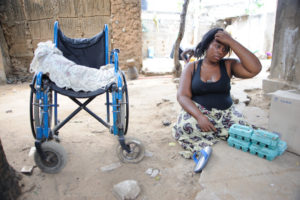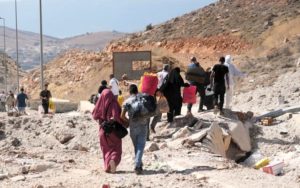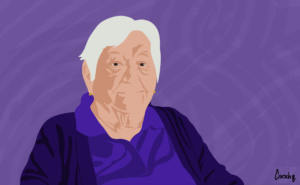Transcript of presentation by Jean-Marie Guehenno:
While I was preparing my notes, this morning, I was trying to think what historians would say in a hundred years about our time; I cannot guess what they will say but let me make a few points that perhaps might shape their thinking.
My first point is that when we see the limits of our planet, when we see what our planet is becoming, our instinctive reaction is to think that the sense of being part of something bigger than ourselves should give us a sense of collective responsibility. However, what it has done is the opposite. It is as if we are all more inward-looking and more apprehensive of a world that we do not control and we are scared of.
Secondly, this universality of our fate, instead of creating and reinforcing a sense of universalism, generates a crisis of universalism and that shows up in every aspect of our lives in the sense that everybody now talks about fake news. Well, there is fake news because the notion of truth has become secondary, and it is not truth, but the search for truth, that creates common ground between human beings. We don’t have that today. Everybody is shutting down in their own little fortresses of ‘truth’ and this is very dangerous. One could say that the good side of it is that there is no hypocrisy today. The kind of nice words we used to hear a decade ago have disappeared. People very bluntly assert what they want to do and they make very little effort to hide their crimes. What is striking to see is that intimidation has become more important than creating a sense of respectability. But the horror of that is that the brutality of words that is such a hallmark of our times is also accompanied by the brutality of actions and I think UAI is documenting that in a very important and useful way.
Thirdly, we see what is happening in Syria, Yemen and in the Tigray region of Ethiopia. The multiplication of situations that are absolutely horrific, do not generate much reaction and that is also a hallmark of our times because actors are much more concerned about creating facts on the ground than about polishing their reputation. They think that it is more important to assert one’s force, create fear and intimidate than be part of the human family.
Here, we come to my fourth point. This is possible because we live in an incredibly asymmetric world. What is striking is how we actually live in two worlds. Most of the time, in rich countries, we keep violence at a distance, closing our borders or retaliating with means such as drones; we have a good life. In countries like Israel, we see an elaborate network of roads that are reserved for one category of people, so that you don’t have to meet the people who have a different life than yours. Even in our modern cities it is the same, one has to take the wrong exit on a highway to see this variation. These gated communities do not only exist in real life but also in the virtual sense because when we see atrocities unfolding on the TV and the internet it all looks like a movie and that distance creates terrible indifference which is one of the greatest threats in our times. And I think this is one of the reasons why terrorism has become such a big issue in developed countries because the magnification of terrorism reflects this desire for a society with zero risks where you don’t see the consequences of your own actions. So, whenever suddenly this other world intrudes into this quiet and peaceful indifference of our world it creates a terrible shock and in a way an overreaction to terrorism with all the consequences for civil liberties.
I have two final points to make. Firstly, how did we get there? Our universality and the triumph of the post-cold war moment were abstract forms of universalism. It was a universalism only of the mind not of the emotions. And of course, the geography of emotions is not the geography of reason and so it is in some ways normal that we care about those close to us more than those in a distant country we know little about, and by pretending otherwise in some ways, this is how we created a backlash. But we can’t stay there, and I want to conclude on what we should do.
This is about restoring our sense of humanity and that makes me think of a friend of UAI who died a few days ago. Edward Mortimer. He had what I call a capacity for indignation. I saw him working with Kofi Annan in the corridors of the UN, where indignation and emotion are rare because it is a cynical world. He had that capacity and he brought it to the secretary-general and his surroundings. It is very important that we don’t continue to live in two separate worlds, the real world of suffering and brutality that we know but do not experience and this world that is in quiet sleep where we ignore our fellow human beings.
I think there is another way: if we want to rebuild our universalism that is under threat , we can do it, but we will succeed only if we do it one person at a time, and that is a break with the Western tradition. There is a big difference between the Chinese and the Western traditions. Our universalism comes from the mind, the Chinese universalism tradition is much more about expanding the natural feelings you have for your loved ones and family gradually to the human family as a whole, so you get to build universalism based on personal experience instead of on reason that comes from the mind. You have to build it through the heart. And I think that UAI is there to reconcile the heart and the mind, the geography of the emotion, and the geography of reason. That is to collect reliable data, document facts but then to make them real so we can break the walls of these fortresses of indifference that we so often retreat to.
Transcript of presentation by Ms Radhya Almutawakel
Yes, there are two worlds. I am from a part of the world where you find what the international community calls the ‘worst humanitarian crisis’; my country is Yemen. It is a man-made crisis where the violations committed by all parties to the conflict have led to this situation. Yemen has been in war since 2014. When I started to work for human rights and having knowledge of International Humanitarian Law, I observed that usually whenever there is a war there are many arguments in the public discourse about who started the war, who deserves to be in power, who is wrong, who is right, and International Humanitarian Law simply answers to all these questions ‘who cares?’ What really matters is how parties to the conflict are respecting and protecting civilians. This is the angle we started to work on. In my organization, Mwatana, we have field researchers from all over Yemen and and we document violations, because we believe that information is important and is the first step to any kind of accountability and advocacy effort. So, we document using the framework of international law and international humanitarian law. We started to document for the purpose of advocacy and now we also document for the purpose of accountability. The violations in Yemen may be like in any other war where there are airstrikes, ground shelling, attacking schools and hospitals, landmines, torture, detention, forced disappearances, and on top of these violations, starvation is used as a weapon of war.
Our international partners really helped us to take our documentation to the world and they opened for us windows to reach the Security Council, the Congress, and stakeholders from all over the world. We were thinking that by telling the truth, by telling what is happening in Yemen things would change a lot. With the passing of time, we started realizing that the war in Yemen is not ignored but ignored. The sense of humanity Jean-Marie talked about needs ‘teeth’ and these ‘teeth’ are accountability. If there is no criminal accountability, then parties to the conflict will not try to protect civilians. What is happening in Yemen is that most of the violations we have documented are very preventable but parties to the conflict do not prevent them because they don’t care. So how do we make them care? We make them care by real accountability. We started as a local organization to search for what is available regarding criminal accountability. I will tell you that we have been shocked to find out that the whole world is designed in a way that enhances impunity more than accountability. So, we did our job on the ground, we are doing very difficult work documenting the violations with very high standards, to ask for an international investigation, and then what?
It is very difficult to use universal jurisdiction because we don’t have a Yemeni diaspora there, it is very difficult to refer the situation to the ICC because the 5 permanent members of the Security Council have their own allies in the war in Yemen, it is very difficult to have an independent court because it will have to go through the security council and that would be too political. If we don’t have a way to use this documentation to hold criminals accountable, then what are we doing? We know this is not our destiny and we are searching the world to find avenues of accountability. This is why I think that we can all work together for it.
The motivation for having accountability mechanisms might come from people who are living in conflict zones, and this is very honourable, but I think those people who live in the ‘other world’ have space, knowledge, access, and time to work for new accountability mechanisms that can be used. We need to push for this international accountability mechanism because the conflict in Yemen is not just a civil war it has a regional and international dimension, so accountability needs to be international, and I think this is a goal we can work for all together, even though the International Humanitarian Law that I’m admiring is very difficult to apply in practice. It is very easy for violators to commit their crimes and very difficult for us to document them, prove them and take them to the court. Because, for example, there are the intention and the patterns of violations we need to establish. In order to prove that there is starvation in Yemen we have been documenting for a long time just to prove the intent and the patterns. It is difficult for us to prove it, but it is not difficult for criminals to make the whole nation starve. I believe a lot in the sense of humanity as described before and that humanity should have a set of tools, and when it comes to human rights violations these tools should be accountability mechanisms.
Response by Antonio Donini
Thank you very much Radhya and Jean-Marie for your interesting and, in a way, complementary remarks. Jean-Marie mentioned the issue of universality which raises some questions, as the way the concept is understood in the West does not necessarily correspond to how it is seen in Yemen or Afghanistan or the rest of the world. But I am with him when he says we need to use information and documentation as well as reason – unifying reason and emotion – to do precisely the things that Radhya is highlighting for Yemen.
I don’t know Yemen at all, but just yesterday I was attending a conference on the prospects of peace in Afghanistan in Doha, on zoom of course, but with a range of participants from Afghanistan (including the President who provided his words of wisdom), the region and some from the North. It struck me that one of the areas where Afghanistan links up with Yemen is the issue of impunity for the war crimes and crimes against humanity of the past. The Afghanistan peace process, back in 2001, suffered from three sins that are likely to arise in other crises: it was a “victor’s peace” where the winners set the stage for what would happen; the victors and the US in particular brought back the reviled warlords that had been defeated by the Taliban; and, thirdly, there was no accountability for the crimes of the past committed by all sides. So now, the chickens have come home to roost: because they were not addressed in the past, Afghans are now confronted with the same issues. Again.
As a result, there is no clear or shared understanding of what peace might look like. The US is in a hurry to leave, come what may, taking no responsibility for the mess they created. The Taliban is keen on a military victory and the government has been put on the sidelines. There is no sense of a common vision of the kind of peace that should emerge, and the Afghan population has no say in the process.
In many other contexts we face the same problem: on one side there are ineffective international institutions that are supposed to be universal and promote peace, and on the other warring parties that resort to violence and, specifically, to the normalization of violence against civilians to advance their agendas. Are we supposed to accept this as the new normal? Thus Jean-Marie’s injunction to us to be more indignant – “indignez-vous!” as Stephane Hessel used to say – is a very strong message. It is also the message that UAI wants to convey: we need to react, we need to mobilize to challenge the way in which wars are conducted.
And as Radhya rightly says, most of the violence that is happening in Yemen, and in other conflicts as well, is in direct violation of International Humanitarian Law (IHL). It is violence that could be controlled if the law was applied. If the States and the belligerents can’t do it, if the UN can’t do it, then we the people have a role to play and to mobilize for change.
One example is common article 1 of the Geneva conventions that says clearly that all states must respect the conventions but also “ensure” that other states and belligerents respect them. Reminding states of this responsibility as a signatory can be a key element in a mobilization campaign against the normalization of violence against civilians. We do not put enough pressure on the free-riders, on the states that are not involved in conflict to remind them of their responsibilities, whether directly because they might be selling weapons to warring parties or indirectly because they are just sitting on the sidelines.
So, thank you both for your important words of encouragement. We need more of this because it boosts our capacity to mobilize!
*Photo taken from the Press Release dated 28 March 2021 on the Mwatana website entitled ‘Civilians in Yemen remain stuck between the warring parties and waiting for justice’. Click here for a link to the Press Release.











